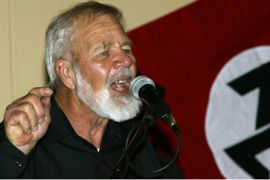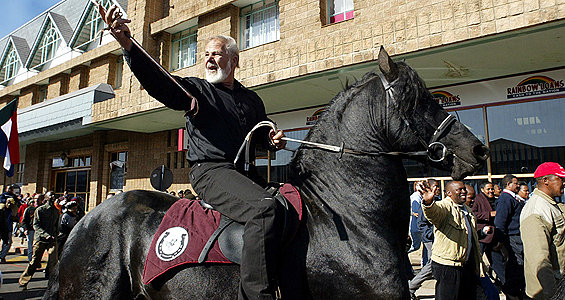S Africa tense over ‘struggle’ song
Political groups try to link white supremacist’s murder to apartheid-era anthem.

 |
| Terreblanche founded the Afrikaner Resistance Movement, a right-wing political group [AFP] |
South African political parties have rushed to link the death of Eugene Terreblanche, an infamous white supremacist, to a row over a controversial “struggle song”.
Terreblanche, the founder of the right-wing Afrikaner Resistance Movement (AWB), was brutally hacked and bludgeoned to death on Saturday, allegedly by two farm workers on his Ventersdorp farm, in South Africa’s North West province.
The song in question, Aye saba amagwala – which in Zulu means “The cowards are afraid” – is an anthem from the era of the struggle against white rule.
It includes the lyrics, dubula ibhunu, which literally means “kill the Boer”, a word used to refer to the descendants of Afrikaans-speaking farmers. However, some struggle veterans say the lyric actually means “kill apartheid”.
Controversial song
Julius Malema, the leader of the African National Congress Youth League (ANCYL), recently infuriated many South Africans when he sang the song with a group of students in Johannesburg.
High Court judges indicted Malema over the song, but the ruling ANC party’s leadership has promised to challenge the High Court’s ruling, expressing disappointment at the judge’s “lack of consideration” for the historical context of the song.
| In depth | |||||
|
The AWB was quick to link Malema’s singing of the song to Terreblanche’s killing.
“His death was a result of Malema’s hate speech and direct orders in the media to shoot the Boers dead,” Andre Nienaber, an AWB member and relative of Terreblanche, was quoted by South Africa’s The Times newspaper as saying.
The opposition Democratic Alliance (DA) also expressed outrage over the attack and made a similar link to “racist” speech.
“The DA calls for people to remain calm and on the ANC to strongly condemn racist utterances which have become synonymous with Malema and his ilk,” Juanita Terblanche, a DA member of parliament, said.
“This happened in a province where racial tension in the rural farming community increasingly is being fuelled by irresponsible racist utterances by Malema and Solly Pheto, the Cosatu secretary in the province,” the DA said.
Cosatu, the Congress of South African Trade Unions, is a part of the Tripartite Alliance, which includes the ANC as well as the South African Communist Party.
Patrick Craven, a Cosatu spokesman, denied there was a connection between Terreblanche’s murder and Malema’s singing of the struggle song and said Cosatu also condemned the killing.
“Despite our major disagreements with Terreblanche there can be no justification of what happened to him,” he said.
‘Politicking and opportunism’
Na’eem Jeenah, a former anti-apartheid activist and director of the Afro-Middle East Centre in Johannesburg, told Al Jazeera the killing had simply provided an opportunity for “politicking” between the political parties.
“The song that was sung by Malema has nothing to do with this murder,” he said.
“We used to sing that song during Apartheid, while marching with white comrades, and it never meant kill all white people.
“This is politicking and opportunism of political parties. The reality is that black people today are poorer than they were before 1994, and that racism still exists and is very much an issue in South Africa.”
 |
| Malema sang the controversial song with students in Johannesburg [File: Reuters] |
Sixteen years since the end of Apartheid, one in three South Africans continues to live in poverty.
The police have said that Terreblanche’s murder was a dispute about unpaid wages and was not politically motivated.
On Saturday evening, two farm workers, aged 16 and 21, reportedly called the police and said that they had killed Terreblanche in self defence, during a fight over their salaries.
Jeenah told Al Jazeera: “These black farmers, who earn less than $40 a month, had a dispute with Terreblanche over unpaid wages. While what they did is totally inexcusable, the incident had nothing to do with the song that Malema sang.”
Soon after Terreblanche’s killing, Jacob Zuma, South Africa’s president, called for calm amid the furore over the song, a call that has been echoed by others in South Africa.
“This was a criminal act and not a racially motivated strategic act aimed at destabilising the country,” Haroon Wadee, a South African social activist, said.
“We should be united now, more than ever, and not allow a foolish act to destroy what we have built.”
